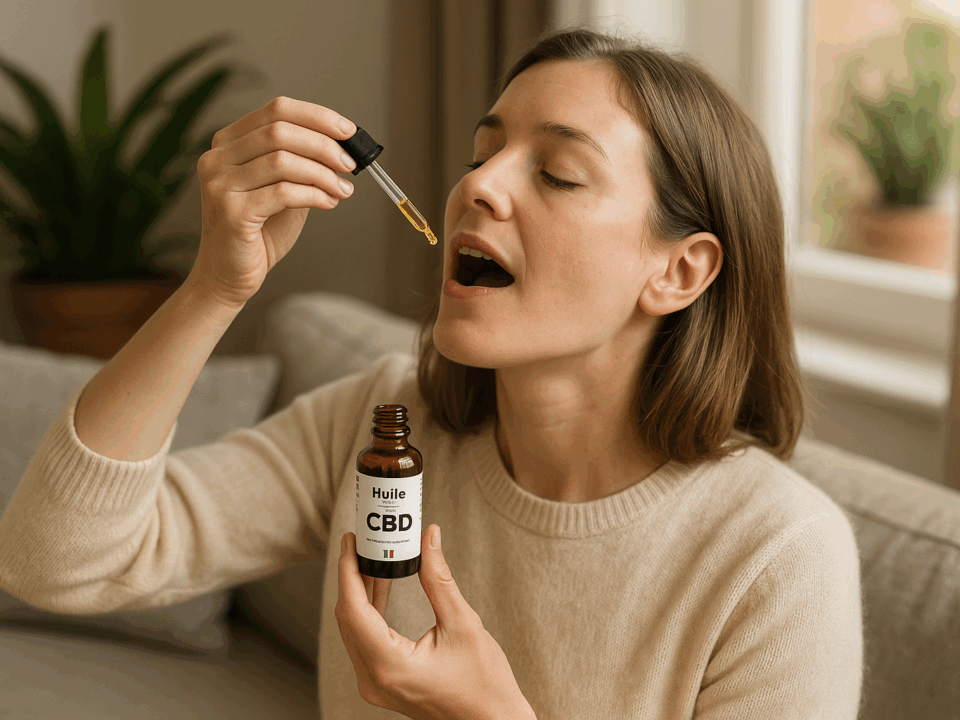
How do you position your CBD patch?
December 12, 2024
[Guide 2025] How to choose your CBG oil? The complete buying guide
May 7, 2025If you don't sleep well, the best advice we can give you is to put the quality of your sleep at the top of your priorities. After all, you do know that you should avoid screens in bed, caffeine and heavy meals, don't you?
Unfortunately, this kind of advice quickly falls by the wayside if you don't establish a rigorous framework beforehand. Yes, let's not mince words. Sleep is a serious matter that has a huge impact on your quality of life. So, as the old saying goes: to great ills, great remedies!
So, without further ado, here are 11 really good tips to help you take back control of your nights and get a better night's sleep.
Table of contents
11 things you can do now to help yourself fall asleep
Some people pride themselves on being able to fall asleep as soon as their head hits the pillow. If this isn't your case, don't worry: if you follow our advice, you too can soon be part of the "I fall asleep in 5 minutes" club 😉
1️⃣ Keeping a sleep diary
The first thing to do is to set up a tool that will enable you to track your sleep. This will enable you to measure, adjust and, above all, identify the solutions that really work.
You can download this sleep diary template, specially designed by sleep health professionals.
2️⃣ Healthy exercise during the day, so you're tired at night!
Whatever your daily routine, you're probably ending your day "at the end of your rope", as the saying goes. But don't confuse "mental fatigue" with "physical fatigue". Most of us work in a sedentary job, which puts a lot of strain on the brain... and very little on the rest of the body.
And to help you fall asleep, there's nothing better than being physically tired. It's radical, especially for anxiety-related sleep disorders.
So, if you can, try to do some physical activity in the fresh air during the day. Walking in a park, running, skipping rope, cycling, or even running short errands without using public transport can be a game-changer.
3️⃣ Resetting your biological clock
The circadian rhythm, or biological clock, is at the root of sleep disorders. It synchronizes your body with the day/night phases. Specifically, it manages the release of the sleep hormone melatonin.
If your internal clock is out of whack, your body secretes melatonin:
- Either too early, from 8pm to 4am. This is known as "phase advance", a very common phenomenon among the elderly;
- Or too late, in the case of "phase delay". Here, the body secretes melatonin from 2 a.m. until mid-morning.
To regulate this mechanism, we need to "re-train" the brain to distinguish between day and night. To achieve this, sleep professionals recommend :
- Exposure to daylight as soon as you wake up;
- Do some physical activity in the first part of the day (which is in line with our tip no. 2);
- Avoid blue light in the evening, as it sends the "day" signal to the brain;
- Sleep in total darkness, which triggers melatonin secretion
- Avoid excitants (tobacco, coffee, tea and dark chocolate) from the afternoon onwards, and reduce alcohol consumption (especially late at night).
4️⃣ Creating a bedtime ritual
To help newborns fall asleep, we recommend setting up a little ritual. This sends a clear signal to your brain: the day is over, it's time to rest.
Your ritual should be simple to carry out, because the most important thing is regularity. Here are a few examples you can easily put in place:
- Set your phone to "do not disturb" mode after a certain time;
- Dim the house lights after dinner;
- Listen to a playlist (always the same one) of soft music;
- Perfume the atmosphere with a little lavender oil;
- Massage your face after brushing your teeth;
- Finally, stretch slightly before going to bed.
After a few weeks, you'll notice that all you have to do is dim the lights in your home to feel the first signs of restful sleep.
5️⃣ Reduce sensory and emotional stimulation!
We often talk about the harmfulness of sensory stimuli, but much less about emotional stimuli. Yet they are just as - if not more - harmful.
Take care of your mental well-being right from the evening meal. Discuss it with your loved ones if necessary. Explain to them that, after a certain hour, you prefer not to talk about certain subjects. Talking about financial difficulties, a toxic manager or natural disasters before going to bed is far too anxiety-provoking! What's more, you won't find a solution at 10pm.
Try, instead, to discuss light subjects, or evoke good memories.
6️⃣ The right room temperature
Now back to the more "down-to-earth" advice. Invest in a thermometer and keep a close eye on the temperature in your bedroom.
In fact, the ideal temperature for sleep is between 16 and 18°C. A room that's too warm prevents you from falling asleep, as the body needs to cool down slightly to trigger sleep.
Remember to air your bedroom regularly, and opt for natural materials like cotton. This will help your body regulate its internal temperature.
7️⃣ Be alert to the first signs of fatigue
Yawning, heavy eyelids, feeling cold... these are all signals your body sends you to say "it's time to sleep"! Ignoring these signals and putting off bedtime (often because of screens) can disrupt your circadian rhythm.
As soon as you feel these signs of fatigue, go to bed without delay. If you miss this window for falling asleep, you may have to wait until the next cycle (around 90 minutes later).
8️⃣ Planning for tomorrow
Many people have trouble falling asleep because they can't get their brains to stop working. A precise plan for the following day is an excellent way of calming many of your worries.
This little habit can also be part of the little ritual we were talking about earlier.
9️⃣ Performing a few yoga postures
If, despite all the above advice, you still can't sleep any better, then try a few relaxation techniques derived from yoga. There's no need to invest in a mat and push all the furniture out of the way to make room.
Some postures can be performed directly in bed, a few minutes before falling asleep. There are many free resources available on the Internet. However, here are a few postures commonly recommended for people suffering from insomnia:
- Child's pose (Balasana): ideal for releasing back tension and calming the mind.
- Legs against the wall (Viparita Karani): improves blood circulation and relaxes heavy legs.
- Seated pinch (Paschimottanasana): stretches the back and helps to calm the mind.
And to really put all the chances on your side to find Morpheus, we advise you to close the whole thing with our following tip 👇
1️⃣0️⃣ Breathing method 4 7 8
Breathing plays a key role in stress management and falling asleep. The 4-7-8 method, developed by Dr. Andrew Weil, is particularly effective in calming the nervous system.
What to do?
1️⃣ Inhale deeply through your nose for 4 seconds.
2️⃣ Hold your breath for 7 seconds.
3️⃣ Exhale slowly through the mouth for 8 seconds.
Repeat this exercise 4 or 5 times, and feel your heart rate slow down... It's a great way to relax your whole body and fall asleep faster.
1️⃣1️⃣ Try CBD oil for better sleep
In addition to techniques and tips for better sleep, there is also a whole range of medicinal plants known to help you fall asleep.
As far as we're concerned, we can tell you all about hemp. And more specifically, CBD, one of its main active molecules. Known for its potential tranquilizing properties, CBD is used to calm stress, anxiety and promote a state of mind conducive to sleep.
It acts on our endocannabinoid system, a set of receptors whose common goal is to promote a state of optimal balance. Among its areas of action, the endocannabinoid system regulates hormone secretion, including melatonin[1].
To find out more, read also: How can CBD combat insomnia?
Although its mechanism of action is still somewhat obscure, some studies point to potential efficacy.
One of them [2] studied 72 people: 47 with chronic stress and 25 with a sleep disorder. After one month of CBD oil treatment, 79.2% reported feeling less stressed on a daily basis, while 66.7% claimed to have better quality sleep.
-
THC-free 10% CBN and 10% CBD "Stress and Sleep" oil
Rating 5.00 out of 534,90 €🌿 "Stress & Sleep" CBN and CBD oil is a natural hemp oil containing 10% CBN and 10% CBD. It thus offers a synergistic action guaranteeing optimal effectiveness to soothe you and improve your sleep.
🚫 THC-free, with no addictive or drowsy effects.
🇨🇵 CBN oil made in France from hemp grown in France.
🧪 1 0ml bottle sold with pipette. 10ml = 250 drops approx.
🧑🔬 Nobilis-Product is a French brand that manufactures its own products.
-
Oil 10% CBD 10% CBN 10% CBG - Comfort Formula
Rating 4.50 out of 539,90 €🌿 Hemp oil concentrated with 10% CBD, 10% CBN and 10% CBG
🧪 10ml bottle with pipette.
-
CBD & CBN gummies Stress and Sleep
15,90 €🍬 Delicious raspberry-flavored gummies enriched with CBD and CBN
😴 For less stress and better quality sleep
🌱 Ingredients 100% of natural origin
🇫🇷 French manufacturing
🍁Dosed at 8mg CBD and 2mg CBN per candy
In case of insomnia, how to get back to sleep...?
Falling asleep is one thing. Falling back asleep in the middle of the night is quite another.
First of all, even if it's hard to suppress this reflex, try not to look at the clock. Doing so will only stress you out and reinforce the idea that waking up will be complicated. On the other hand, if you're looking at the time on your phone, chances are you'll be taking advantage of the opportunity to check your social networks. As you know, this is one of the worst things you can do.
Instead, practice the breathing exercises we talked about a paragraph earlier. If that doesn't work, then don't struggle. Get up quietly, and go and sit down in another room. Avoid turning on too bright a light, and make yourself a little herbal tea (without theine!).
If you still don't feel like going to bed, try taking a cool shower. Contrary to popular belief, cold doesn't necessarily excite the body - it helps it to calm down.
You can also write down your thoughts as they come in a notebook. Automatic writing can unlock some of the unconscious knots that keep you awake.
Finally, if nothing works, and if it's repeated night after night, then perhaps you should consider consulting a professional.

Sleep disorders: when should you consult a professional?
If, despite all our advice, you regularly suffer from difficulty falling asleep, frequent night-time awakenings or chronic fatigue, then it may be worth consulting a sleep specialist.
Indeed, in some cases, you should not hesitate to talk to qualified people. Remember: big problems call for big solutions! Taking care of yourself also means recognizing that you need help.
If your sleep problems persist over several weeks and are having a noticeable impact on your well-being, don't hesitate any longer. Make an appointment with a sleep specialist or psychologist.
This will help you to pinpoint the causes of sleep disorders and take appropriate action.
With that, take care and good night!
Sources
[1] Endocannabinoids and the control of energy homeostasis, Journal of biological Chemistry
[2] Cannabidiol in anxiety and sleep: a large case series, Pubmed










